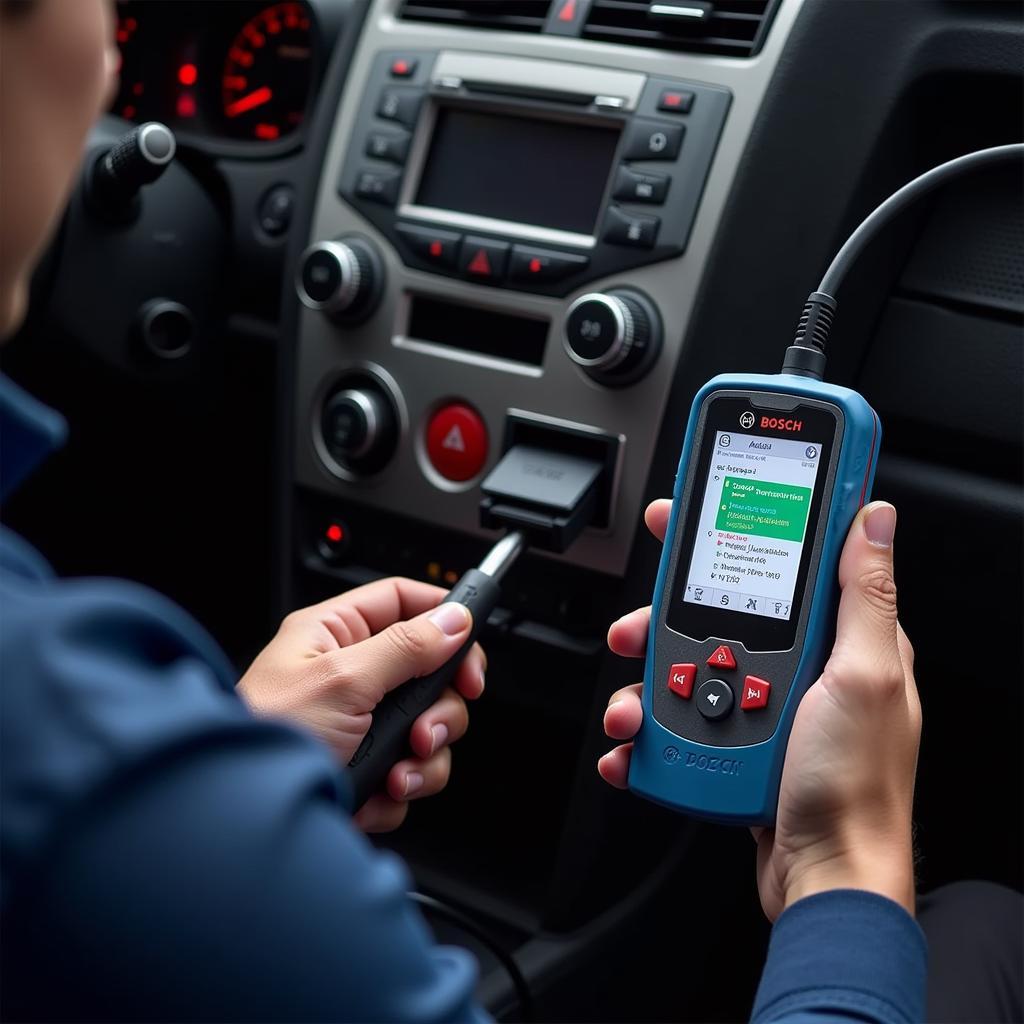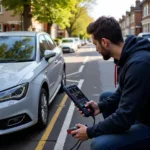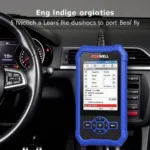Car odometer correction using Bosch diagnostics is a complex topic often shrouded in misinformation. Whether you’re a car owner, mechanic, or simply curious, understanding the intricacies of this process is crucial. This article delves into the world of car odometer correction with a focus on Bosch diagnostic tools, exploring its legality, ethical implications, and the technical aspects involved.
The Legality and Ethics of Car Odometer Correction
Tampering with a car’s odometer is illegal in many jurisdictions, primarily due to its potential for fraud. It’s essential to differentiate between illegal odometer rollback for fraudulent purposes and legitimate odometer adjustments. Legitimate reasons might include instrument cluster replacement, mechanical repairs, or correcting discrepancies caused by faulty components. However, these adjustments must be documented accurately and transparently. The ethical implications are equally important. Misrepresenting a vehicle’s mileage can deceive potential buyers and impact its resale value. Even if legal, undisclosed odometer adjustments can erode trust and create future complications.
Bosch Diagnostics: A Powerful Tool for Odometer Adjustments
Bosch diagnostic tools are renowned for their comprehensive capabilities, including accessing and potentially adjusting odometer readings in various vehicle makes and models. These tools offer advanced functionalities for diagnosing and troubleshooting various vehicle systems, making them invaluable for professional mechanics. However, the ability to access odometer data comes with a significant responsibility. Bosch itself emphasizes the importance of using its tools ethically and legally, urging users to adhere to all applicable regulations.
 Bosch Diagnostic Tool Adjusting Odometer
Bosch Diagnostic Tool Adjusting Odometer
How Bosch Diagnostics Works with Odometers
Bosch diagnostic tools communicate with a vehicle’s onboard computer systems through the OBD-II port. This allows access to a wealth of data, including the odometer reading. Depending on the specific vehicle model and the Bosch tool used, mechanics can read, diagnose, and potentially adjust the odometer reading. The process often involves specialized software and security protocols to prevent unauthorized modifications.
Understanding the Risks of Incorrect Odometer Correction
Incorrectly adjusting an odometer, even unintentionally, can lead to various problems. These can range from minor discrepancies in mileage records to significant legal and financial repercussions. Using outdated or incompatible software can corrupt vehicle data, leading to malfunctions and costly repairs. Furthermore, tampering with odometer readings without proper documentation can void warranties and raise red flags during inspections.
Best Practices for Using Bosch Diagnostics for Odometer Correction
If an odometer adjustment is necessary and legal, it’s crucial to follow best practices. This includes using the latest Bosch diagnostic software and hardware, ensuring compatibility with the specific vehicle model, and meticulously documenting the entire process. Consulting with legal experts and automotive specialists is highly recommended to ensure compliance with all regulations and avoid potential pitfalls. Transparency with potential buyers is paramount if an odometer adjustment has been made.
When is Car Odometer Correction Necessary?
Car odometer correction becomes necessary in specific situations, such as after instrument cluster replacements, ECU repairs, or when addressing mechanical issues affecting mileage recording. Sometimes, older vehicles experience odometer malfunctions, requiring correction to reflect the actual mileage. In such cases, accurate documentation and adherence to legal guidelines are crucial.
Conclusion: Navigating the Complexities of Car Odometer Correction with Bosch Diagnostics
Car odometer correction using Bosch diagnostics requires a deep understanding of the technical, legal, and ethical aspects involved. While Bosch tools offer powerful capabilities, responsible and informed usage is paramount. By prioritizing ethical practices, adhering to regulations, and seeking expert guidance when necessary, you can navigate the complexities of odometer correction and ensure compliance while maintaining transparency.
FAQ
- Is car odometer correction legal? It depends on the jurisdiction and the reason for the correction. Fraudulent odometer rollback is illegal in most places.
- Can I use Bosch diagnostics to adjust my car’s odometer? Bosch diagnostics can access odometer data, but adjustments should only be made by qualified professionals for legitimate reasons and in accordance with local laws.
- What are the risks of incorrect odometer correction? Incorrect adjustments can lead to legal issues, financial losses, and vehicle malfunctions.
- How can I ensure legal and ethical odometer correction? Consult with legal experts and automotive specialists, document the process thoroughly, and maintain transparency with potential buyers.
- What are some legitimate reasons for odometer correction? Legitimate reasons include instrument cluster replacement, mechanical repairs, or correcting discrepancies caused by faulty components.
- Where can I find more information about Bosch diagnostic tools? Visit the official Bosch website or contact a certified Bosch dealer.
- How can I verify the accuracy of my car’s odometer reading? Consult a qualified mechanic with experience using professional diagnostic tools.
Common Scenarios Requiring Odometer Correction
- Faulty Instrument Cluster: A malfunctioning instrument cluster may display incorrect mileage, requiring correction after repair or replacement.
- ECU Replacement: Replacing the Engine Control Unit (ECU) can sometimes affect the stored mileage, necessitating an adjustment.
- Mechanical Repairs: Certain mechanical repairs, such as transmission or axle replacements, can impact the odometer reading and require recalibration.
Further Exploration
For more information on related topics, consider exploring articles on vehicle diagnostics, ECU programming, and automotive legal regulations.
Need further assistance? Contact us via WhatsApp: +1(641)206-8880, Email: [email protected]. We have a 24/7 customer support team ready to help.

